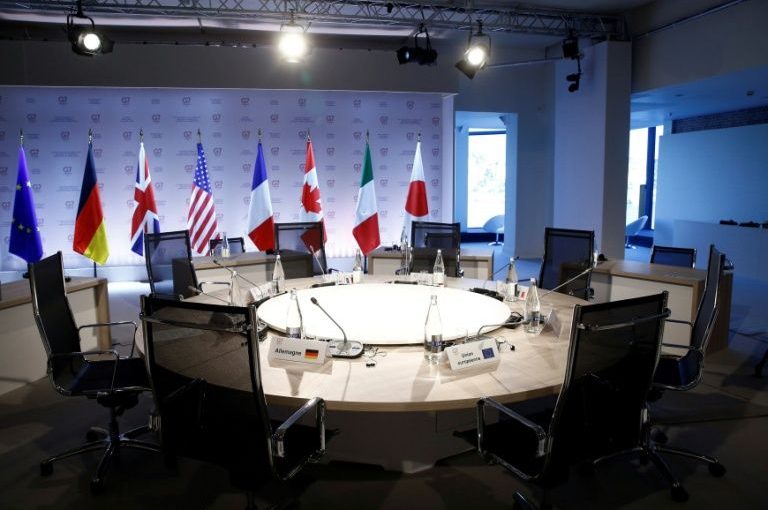Trump lavishes praise on Saudi crown prince, signaling renewed alliance
G7 ministers ‘committed’ to debt relief, urge expansion

G7 finance minister lamented moves by some countries to classify state-owned financial institutions as commercial lenders to avoid participating in debt relief
- Finance ministers of the United Kingdom, Canada, France, Germany, Italy, Japan, and the United States support suspending poor countries’ debt repayments until the end of 2020
G7 finance ministers on Friday, September 25, said they “remain committed” to a debt suspension program announced in April meant to help the poorest nations weather the coronavirus pandemic.
They also again called for private creditors to implement the Debt Service Suspension Initiative (DSSI) agreed to by the G20 and Paris Club that would suspend debt repayments through the end of the year.
“We reiterate our call for private creditors to implement the DSSI on a voluntary basis when requested by eligible borrowers,” a communique issued via the United States Treasury by the group of 7 most industrialized nations said.
“Voluntary private sector participation has been absent, which has limited the potential benefits for several countries,” it said.
The DSSI has so far freed up $5 billion for 43 countries to offset the health and economic effects caused by COVID-19 – but that’s much less than Mohammed al-Jadaan, finance minister of current G20 president Saudi Arabia, predicted when the program was announced.
“I welcome the #G7’s call for #DSSI extension, more debt transparency, & action on debt relief beyond just suspension. Speed is needed to help the world’s poorest fight the impact of #COVID19,” World Bank President David Malpass said after the statement’s release.
‘Very challenging situation’
As the coronavirus pandemic wreaked havoc on the global economy, finance ministers and central bankers from the G20 had in April endorsed an immediate one-year debt suspension for the poorest countries, which are particularly vulnerable to the economic impacts of the COVID-19 pandemic.
At the time, they indicated about 70 countries would be eligible for assistance.
The International Monetary Fund (IMF) in June predicted the virus would wipe out $12 trillion over two years and world gross domestic product would drop 4.9% this year, but on Thursday, September 24, fund spokesman Gerry Rice hinted the outlook may be better than expected.
The situation is still “very challenging” for countries other than China, Rice said, with emerging markets facing “precarious” prospects caused by falling commodity prices, reduced export demand, fewer tourists, and declining remittances from abroad.
State-controlled or private?
The G7 bloc composed of the United Kingdom, Canada, France, Germany, Italy, Japan, and the United States acknowledged that sentiment in its Friday statement.
“Recognising the ongoing financial needs of low-income countries, we support extending the DSSI in the context of a request for IMF financing,” the ministers said.
They added that the extension “should reflect the G20’s commitment to transparency and creditor coordination…as well as [reflect] the need for fair burden sharing among all creditors.”
The ministers also said they “strongly regret” moves by some countries to classify state-owned financial institutions as commercial lenders to avoid participating in the initiative.
G20 finance ministers are meeting next month, and the G7 statement also calls on them to agree on terms for further debt relief for poor nations.
Read the G7 Statement below
Africa: G7 Finance Ministers’ Statement on the Debt Service Suspension Initiative and Debt Relief for Vulnerable Countries
We remain committed to working together to support the poorest and most vulnerable countries as they address health and economic challenges associated with COVID-19. The pandemic has significantly disrupted global growth and necessitated extraordinary fiscal policy efforts, exacerbating existing debt vulnerabilities in many low-income countries. We commend the efforts of the international financial institutions (IFIs) to rapidly scale up financial and technical assistance to these countries. We ask the IMF and World Bank to update regularly assessments of the financing needs of low-income countries in response to evolving circumstances with the impact of the pandemic and propose ways for countries to cover expected financing gaps, including through instruments to leverage access to private finance.
To support our efforts to help the most vulnerable countries, we are implementing the G20-Paris Club Debt Service Suspension Initiative (DSSI) to suspend official bilateral debt payments for the poorest countries through end-2020. The DSSI has been fundamental in supporting the 43 countries that have requested the benefits of the initiative by freeing up $5 billion in fiscal space to fund social, health, and economic measures to respond to the pandemic.
G20 and Paris Club official bilateral creditors are continuing to coordinate closely to provide full and transparent relief under the DSSI. Nonetheless, DSSI implementation has faced shortcomings that have prevented the initiative from delivering its full potential. In particular, we strongly regret the decision by some countries to classify large state-owned, government-controlled financial institutions as commercial lenders and not as official bilateral creditors, without providing comparable treatment nor transparency, thus significantly reducing the magnitude of the initiative and the benefits of the DSSI for developing countries. Claims considered as commercial for the purpose of the DSSI will be treated as commercial claims as well in future debt treatments, and for the implementation of IMF policies. We call on non-Paris Club lenders to commit to full and transparent implementation of the DSSI through all government entities going forward. Additionally, voluntary private sector participation has been absent, which has limited the potential benefits for several countries. We reiterate our call for private creditors to implement the DSSI on a voluntary basis when requested by eligible borrowers.
Recognising the ongoing financial needs of low-income countries, we support extending the DSSI in the context of a request for IMF financing. The modalities of the extension should reflect the G20’s commitment to transparency and creditor coordination, including an understanding on key features for debt treatment beyond the DSSI, as well as reflecting the need for fair burden sharing among all creditors. To this end, we strongly urge full and transparent participation by official bilateral creditors, including all state-owned lending institutions, based on an enhanced term sheet and, ideally, a common Memorandum of Understanding that clarifies DSSI implementation.
Going forward, we recognise that some countries will need further debt treatment in addition to the DSSI’s liquidity relief to restore debt sustainability. In this context, we support the development of a Common Framework for future debt treatments beyond the DSSI, to be agreed by the G20 and Paris Club by the time of the October G20 Finance Ministers and Central Bank Governors’ meeting. The Framework should set out provisions for the scope of creditor participation and transparency, and call for coordinated debt relief on a case-by-case basis in the context of a full-fledged IMF program. The Framework should ensure fair burden sharing among all official bilateral creditors, and debt relief by private creditors at least as favourable as that provided by official bilateral creditors. It should also lay the foundation for sound and robust financing practices in the future, including on transparency and governance. We strongly urge all official bilateral creditors to support and adhere to such a G20-Paris Club Framework to set clear expectations for all. Additionally, G20 and Paris Club creditors should jointly agree on specific terms for country-by-country debt restructurings.
Addressing debt vulnerabilities also requires full transparency by both creditor and borrower countries. We commend the World Bank Group’s efforts to compile and publicly disclose creditor-by-creditor information. All creditors should provide complete information to maximize the benefits of the DSSI. We call on the G20 to endorse the full and timely publication of the World Bank and IMF updates on the implementation of the DSSI. We also call on G20 members to endorse the World Bank and IMF’s debt data reconciliation and the publication of the results. This exercise is crucial to inform any future debt treatments. More broadly, we strongly support efforts of the IFIs to help their member countries strengthen debt sustainability and transparency practices, including through technical assistance, lending policies, and enhanced public reporting of debt data. We welcome ongoing work by the Institute of International Finance to finalize rapidly a data host for their Voluntary Principles on Debt Transparency.













Leave a Reply
Be the First to Comment!
You must be logged in to post a comment.
You must be logged in to post a comment.